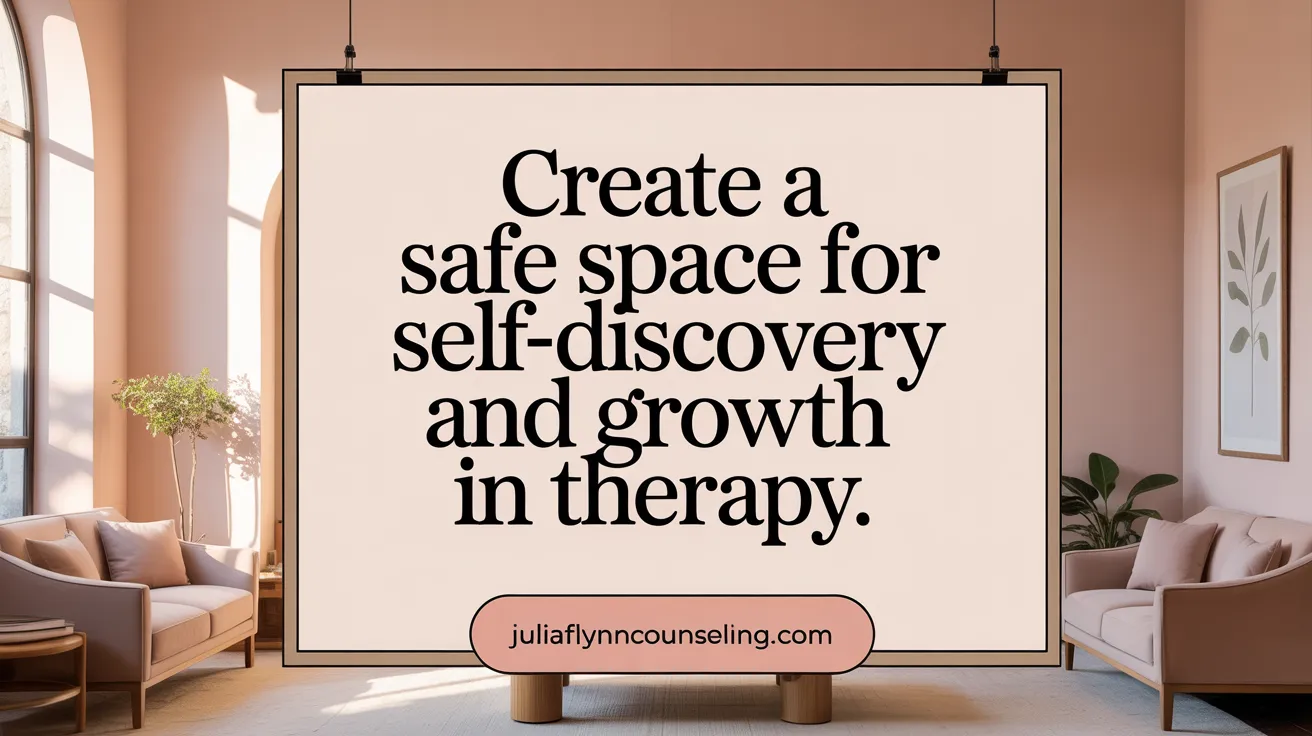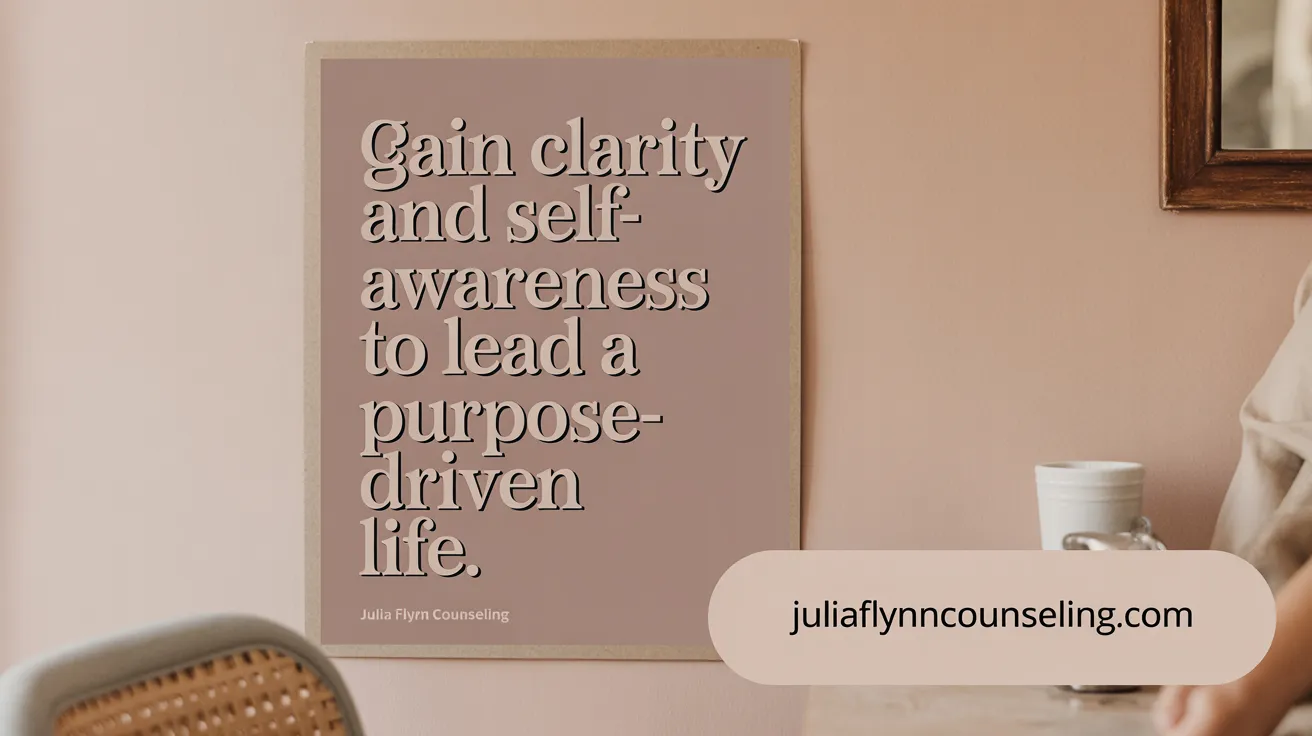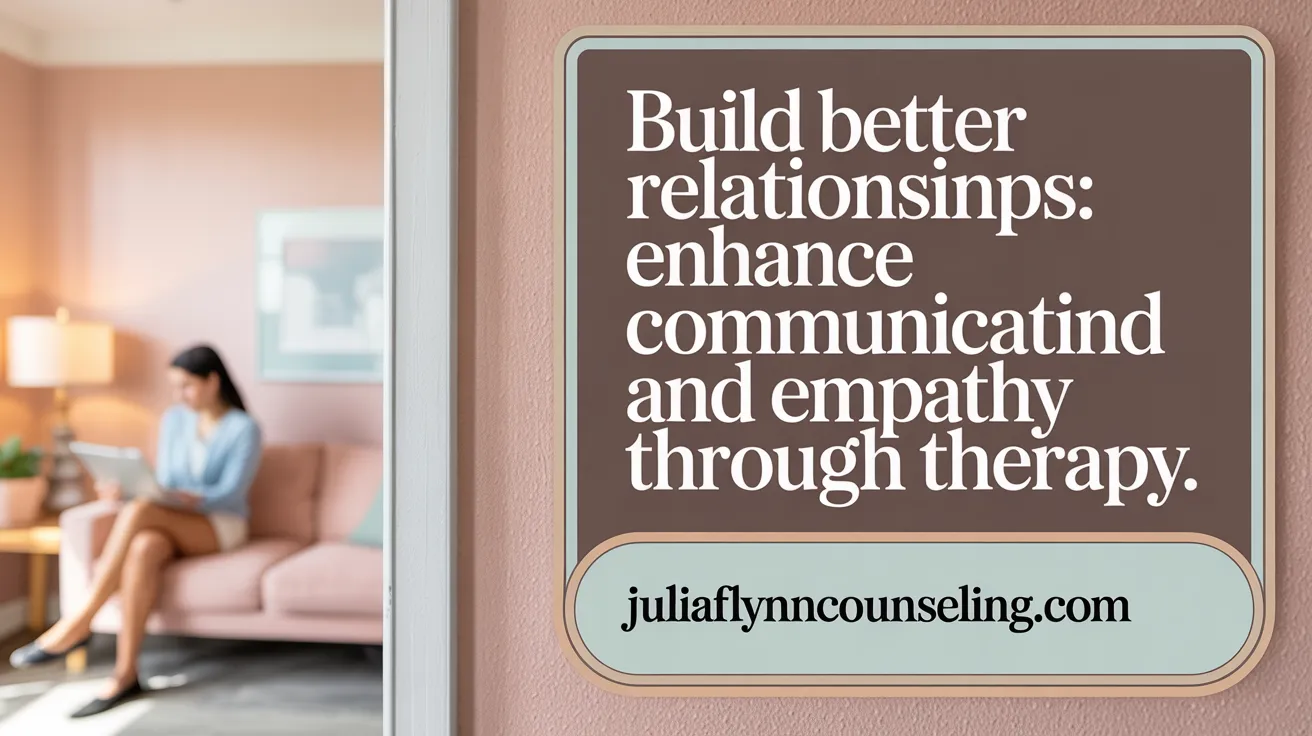Therapy as a Launchpad for Personal Development
Understanding Therapy
Therapy, often referred to as individual or one-on-one talk therapy, is a confidential, structured relationship between a client and a trained mental health professional. It creates a safe and judgment-free space where clients can freely explore their thoughts, emotions, and behaviors.
Emotional Processing and Self-Awareness
A central function of therapy is to support emotional processing, allowing clients to reflect on and make sense of their feelings. This process fosters increased self-awareness, helping individuals recognize patterns rooted in past experiences. Through this awareness, clients develop healthier thought patterns and build emotional skills such as regulation and resilience.
Why People Seek Therapy
Individuals often begin therapy for various reasons, including managing anxiety or depression, navigating grief, working through trauma, handling stress or burnout, improving self-esteem, exploring identity or purpose, and coping with life transitions. Therapy acts as a personalized support system tailored to meet these diverse needs, guiding clients toward growth and healing.
Building Emotional Resilience and Healing Through Therapy

How Does Therapy Help Develop Emotional Regulation and Coping Skills?
Therapy provides a supportive environment where individuals learn to recognize and manage their emotional responses. Techniques such as Cognitive Behavioral Therapy (CBT) guide clients in identifying thought patterns that trigger intense emotions and replacing them with healthier perspectives. Therapists also teach practical coping strategies including mindfulness, grounding exercises, and acceptance-based methods. These skills enable clients to tolerate stress, reduce anxiety, and respond constructively to challenging situations.
In What Ways Does Therapy Support Healing from Past Wounds Using CBT, EMDR, and Psychodynamic Approaches?
Healing through therapy often involves processing unresolved emotions linked to traumatic experiences. CBT helps clients reframe negative cognitions associated with past events. Eye Movement Desensitization and Reprocessing (EMDR) specifically targets traumatic memories by facilitating their integration in a safe and structured way. Psychodynamic therapy explores unconscious influences and early life experiences, allowing individuals to understand root causes of emotional pain and work through them gradually. Together, these approaches support emotional recovery and growth.
How Can Therapy Aid in Processing Trauma, Grief, and Burnout?
Therapy offers a confidential one-on-one talk therapy space to explore difficult emotions related to trauma, loss, or chronic stress. Professional guidance aids in naming and validating feelings, reducing shame or self-blame. Therapeutic techniques encourage clients to develop resilience, regain a sense of control, and gradually restore balance in daily life. By addressing these challenges directly, therapy helps break cycles of avoidance and promotes long-term healing.
What Role Do Mindfulness and Acceptance Techniques Play in Managing Stress?
Incorporating mindfulness and acceptance practices into therapy supports emotional regulation by increasing present-moment awareness and reducing reactive patterns. Mindfulness-Based Stress Reduction (MBSR) teaches clients to observe sensations and thoughts non-judgmentally, fostering calm and clarity. Acceptance-based therapies encourage embracing discomfort without resistance, which builds tolerance to distressing emotions and strengthens resilience. These skills empower clients to manage stress more effectively and cultivate emotional well-being.
The Therapeutic Relationship: Foundation for Self-Improvement

Why Is a Safe and Confidential Space Vital in Therapy?
A cornerstone of effective therapy is a safe and confidential space for self-exploration. This secure space enables clients to openly share their feelings, thoughts, and challenges without fear of criticism or breach of privacy. When individuals trust this environment, they are more likely to engage honestly, fostering deeper self-exploration and emotional healing. This judgment-free therapy space nurtures personal growth by supporting authentic expression and vulnerability.
How Does Therapeutic Rapport Influence Progress?
Building a strong rapport between therapist and client is essential for successful outcomes. Open communication allows clients to feel understood and respected, promoting trust and collaboration. Therapists employ active listening in counseling, empathy, and supportive feedback to foster this connection. When clients feel genuinely heard, they are more willing to explore sensitive issues, experiment with new coping skills, and commit to change.
How Is Therapy Tailored to Individual Needs and Goals?
Each therapy journey is personalized to reflect an individual's unique history, concerns, and aspirations. Therapists assess the client’s background and objectives during initial sessions to select appropriate therapeutic techniques that resonate with the client’s style and needs. Methods such as Cognitive Behavioral Therapy (CBT), Acceptance and Commitment Therapy (ACT), or Mindfulness-Based Stress Reduction (MBSR) are adapted to address specific emotional or behavioral patterns. This tailored therapeutic approaches enhances engagement and effectiveness.
How Does Ongoing Support and Milestone Setting Foster Growth?
Therapy is a dynamic process involving continual reflection, skill-building, and goal-setting. Therapists collaborate with clients to identify achievable milestones, celebrate progress, and adjust strategies as needed. This structured support helps maintain motivation and promotes sustained personal development. Regular sessions provide an anchor for clients to process experiences, refine coping mechanisms, and deepen self-awareness, paving the way for therapy milestones and lifelong personal growth.
Diverse Therapy Approaches for Unlocking Potential

Overview of Cognitive Behavioral Therapy (CBT), Acceptance and Commitment Therapy (ACT), Mindfulness-Based Stress Reduction (MBSR)
[Cognitive Behavioral Therapy (CBT)] is a widely used therapy that focuses on identifying and changing negative thought patterns to improve emotional and behavioral responses. It helps clients recognize unhelpful beliefs and develop coping strategies to manage anxiety, depression, and other challenges.
[Acceptance and Commitment Therapy (ACT)] encourages embracing thoughts and emotions without judgment, promoting mindfulness and aligning actions with personal values to foster authenticity and resilience.
[Mindfulness-Based Stress Reduction (MBSR)] combines mindfulness meditation and awareness practices to reduce stress, improve emotional regulation, and enhance self-awareness.
Humanistic, Psychodynamic, Solution-Focused, and Integrative Therapies
[Humanistic therapies], such as person-centered and Gestalt therapy, emphasize personal growth, self-discovery, and living authentically. They support individuals in exploring meaning, choice, and emotional expression.
[Psychodynamic therapy] explores unconscious processes and past experiences to heal emotional wounds and understand behavior patterns.
[Solution-Focused Therapy] concentrates on identifying client strengths and envisioning desired outcomes to create practical goal-setting and rapid progress.
[Integrative therapy] blends techniques from multiple approaches tailored to each person’s unique needs, fostering holistic healing.
How Different Methods Target Thought Patterns, Emotional Healing, and Behavior Change
CBT primarily addresses dysfunctional thinking to change emotions and actions, while psychodynamic therapy focuses on uncovering hidden emotional conflicts.
Mindfulness and ACT foster emotional acceptance and resilience, aiding emotional regulation.
[Behavior therapy techniques] work on modifying habits and responses through learning principles.
Techniques Like Narrative Therapy, Compassion-Focused Therapy, and Somatic Coaching
[Narrative therapy] helps separate individuals from their problems by re-authoring personal stories to highlight strengths.
[Compassion-focused therapy] develops self-kindness and emotional regulation through visualization and mindfulness.
[Somatic coaching] integrates mind-body awareness using movement and bodily sensations to access deeper self-knowledge and enhance emotional well-being.
These diverse approaches and techniques provide comprehensive tools that empower individuals on their journey towards [personal growth] and unlocking their fullest potential.
Therapy’s Role in Enhancing Self-Awareness and Clarity of Purpose

Increasing insight into thought, emotional, and behavioral patterns
Therapy provides a safe and confidential space for self-exploration for clients to explore their inner experiences deeply. Through techniques like Cognitive Behavioral Therapy (CBT) and reflective talk therapy, individuals gain awareness of their recurring thought patterns, emotional reactions, and behaviors. This insight helps clients recognize how past experiences and unconscious factors influence their current responses.
Clarifying values, identity, and life goals through reflection
A powerful benefit of therapy is the opportunity to reflect on core personal values and identity. Guided by trained therapists, clients explore what truly matters to them, fostering clarity around life purpose and meaningful goals. This awareness supports making conscious choices aligned with their authentic selves.
Developing a growth mindset via therapy
Therapy encourages adopting a growth mindset—the belief that abilities and emotional resilience develop through effort and learning. Therapeutic approaches like Acceptance and Commitment Therapy (ACT) and mindfulness emphasize viewing challenges as opportunities for development. This mindset boosts confidence and persistence in overcoming obstacles.
Therapy’s support in decision-making and aligning actions with authentic self
By increasing self-awareness and clarifying values, therapy strengthens decision-making skills. Clients learn to align daily actions with their genuine identity and goals, fostering authenticity and fulfillment. Therapists also assist in setting realistic goals and breaking them into manageable steps to maintain motivation and track progress.
Overall, therapy acts as a catalyst that deepens self-understanding, nurtures purposeful living, and promotes sustained personal growth through insight, reflection, mindset shifts, and empowered choices.
Fostering Healthier Relationships and Communication Skills Through Therapy

Improving interpersonal dynamics
Therapy offers a safe and confidential space for self-exploration, where individuals can explore and understand their patterns of relating to others. This self-awareness enables clients to identify behaviors or emotional responses that may be hindering their relationships. By working through these challenges, individuals develop greater emotional insight, leading to healthier interpersonal dynamics.
Learning empathy, effective communication, and boundary-setting
A significant focus of therapy is enhancing communication skills and empathy. Therapists guide clients in expressing their needs clearly and listening with understanding. Boundary-setting is also emphasized, empowering individuals to protect their well-being while respecting others. These skills help create respectful and mutually satisfying connections.
Resolving conflicts and recognizing relational patterns
Therapy helps individuals recognize recurring relational patterns that may contribute to conflict or dissatisfaction. Through reflective discussions and evidence-based approaches like cognitive-behavioral therapy (CBT), clients learn strategies to manage and resolve conflicts constructively. This fosters emotional regulation and helps break cycles of misunderstanding or hurt.
Therapy’s impact on social and professional connections
Improved communication and relationship skills gained in therapy extend beyond personal relationships to social and professional environments. Enhanced empathy and conflict resolution abilities contribute to stronger teamwork, leadership, and social support networks, supporting overall wellbeing and satisfaction in multiple life areas.
Continuing the Journey: How Therapy Sustains Lifelong Personal Growth
Therapy as an Ongoing Catalyst for Transformation
Therapy is not just a one-time fix but a continuous process that fosters lasting change. It acts as a steady catalyst, enabling individuals to deepen self-awareness, refine emotional regulation, and develop healthier relationships over time.
Beyond the Therapy Sessions: Integrating Self-Care, Reflection, and Community Support
The benefits of therapy extend well beyond the counseling room. Practicing daily self-care, engaging in regular self-reflection through journaling or meditation, and cultivating support within communities provide essential reinforcement for sustained growth.
Embracing Patience, Self-Compassion, and Celebrating Progress
A lifelong approach to personal growth encourages patience and self-compassion. Recognizing and celebrating small successes nurtures motivation and reinforces resilience, turning each milestone into a stepping stone for further development.
Empowerment and Resilience from Sustained Therapeutic Engagement
With ongoing therapeutic guidance, individuals gain empowerment to face challenges confidently. Therapy strengthens resilience, equipping people to adapt positively to setbacks and maintain mental wellness throughout life’s changes.
